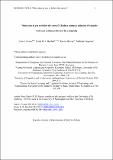Files in this item
When does it pay to follow the crowd? Children optimize imitation of causally-irrelevant actions performed by a majority
Item metadata
| dc.contributor.author | Evans, Cara L. | |
| dc.contributor.author | Burdett, Emily R. R. | |
| dc.contributor.author | Murray, Keelin | |
| dc.contributor.author | Carpenter, Malinda | |
| dc.date.accessioned | 2022-07-16T23:36:08Z | |
| dc.date.available | 2022-07-16T23:36:08Z | |
| dc.date.issued | 2021-12 | |
| dc.identifier | 274754600 | |
| dc.identifier | 2a55664f-2fd5-4941-8d52-a62ad376f687 | |
| dc.identifier | 85110523437 | |
| dc.identifier | 000685653000003 | |
| dc.identifier.citation | Evans , C L , Burdett , E R R , Murray , K & Carpenter , M 2021 , ' When does it pay to follow the crowd? Children optimize imitation of causally-irrelevant actions performed by a majority ' , Journal of Experimental Child Psychology , vol. 212 , 105229 . https://doi.org/10.1016/j.jecp.2021.105229 | en |
| dc.identifier.issn | 0022-0965 | |
| dc.identifier.other | ORCID: /0000-0003-3983-2034/work/97473664 | |
| dc.identifier.uri | https://hdl.handle.net/10023/25663 | |
| dc.description | This work was supported by the John Templeton Foundation (40128). | en |
| dc.description.abstract | Cultural evolutionary theory posits that human cultural complexity rests on a set of adaptive learning biases that help to guide functionality and optimality in social learning, but this sits in contrast with the commonly held view that children are unselective “over-imitators.” Here, we tested whether 4- and 6-year-old children use social learning biases flexibly to fine-tune their copying of irrelevant actions. Children watched a video of a majority demonstrating causally irrelevant actions and a minority demonstrating only causally relevant actions. In one condition observers approved of the majority and disapproved of the minority, and in the other condition observers watched the majority and minority neutrally. Results showed that both 4- and 6-year-olds copied the inefficient majority more often than the efficient minority when the observers had approved of the majority’s actions, but they copied the efficient minority significantly more when the observers had watched neutrally. We discuss the implications of children’s optimal selectivity in copying and the importance of integrating social approval into majority-biased learning when acquiring norms and conventions and in broader processes of cultural evolution. | |
| dc.format.extent | 968528 | |
| dc.language.iso | eng | |
| dc.relation.ispartof | Journal of Experimental Child Psychology | en |
| dc.subject | Over-imitation | en |
| dc.subject | Majority bias | en |
| dc.subject | Cultural evolution | en |
| dc.subject | Social learning strategies | en |
| dc.subject | Social learning biases | en |
| dc.subject | BF Psychology | en |
| dc.subject | DAS | en |
| dc.subject.lcc | BF | en |
| dc.title | When does it pay to follow the crowd? Children optimize imitation of causally-irrelevant actions performed by a majority | en |
| dc.type | Journal article | en |
| dc.contributor.sponsor | John Templeton Foundation | en |
| dc.contributor.institution | University of St Andrews. School of Psychology and Neuroscience | en |
| dc.contributor.institution | University of St Andrews. Centre for Research into Equality, Diversity & Inclusion | en |
| dc.contributor.institution | University of St Andrews. Centre for Social Learning & Cognitive Evolution | en |
| dc.identifier.doi | 10.1016/j.jecp.2021.105229 | |
| dc.description.status | Peer reviewed | en |
| dc.date.embargoedUntil | 2022-07-17 | |
| dc.identifier.url | https://www.sciencedirect.com/science/article/pii/S0022096521001478?via%3Dihub#s0070 | en |
| dc.identifier.grantnumber | 40128 | en |
This item appears in the following Collection(s)
Items in the St Andrews Research Repository are protected by copyright, with all rights reserved, unless otherwise indicated.

